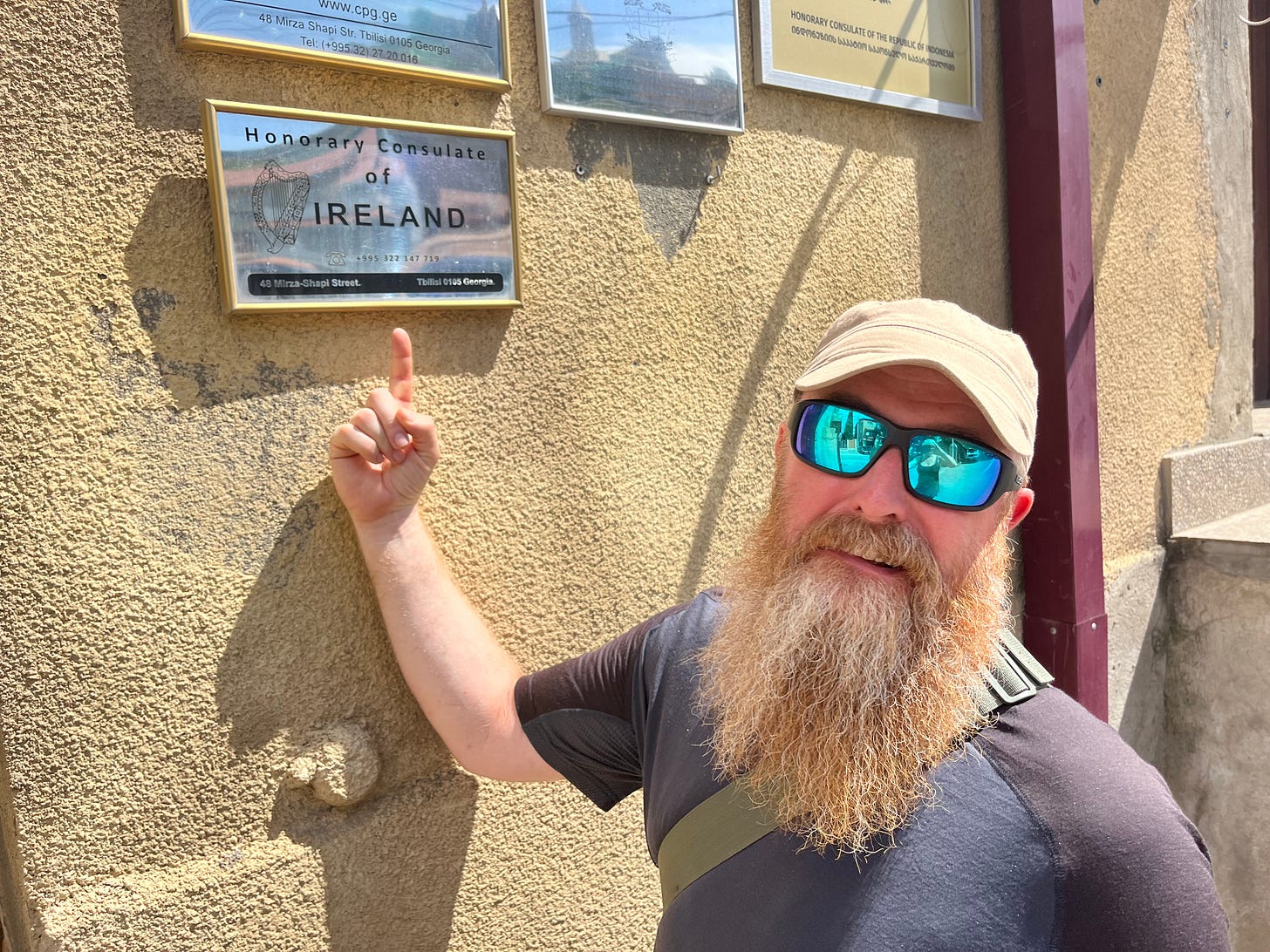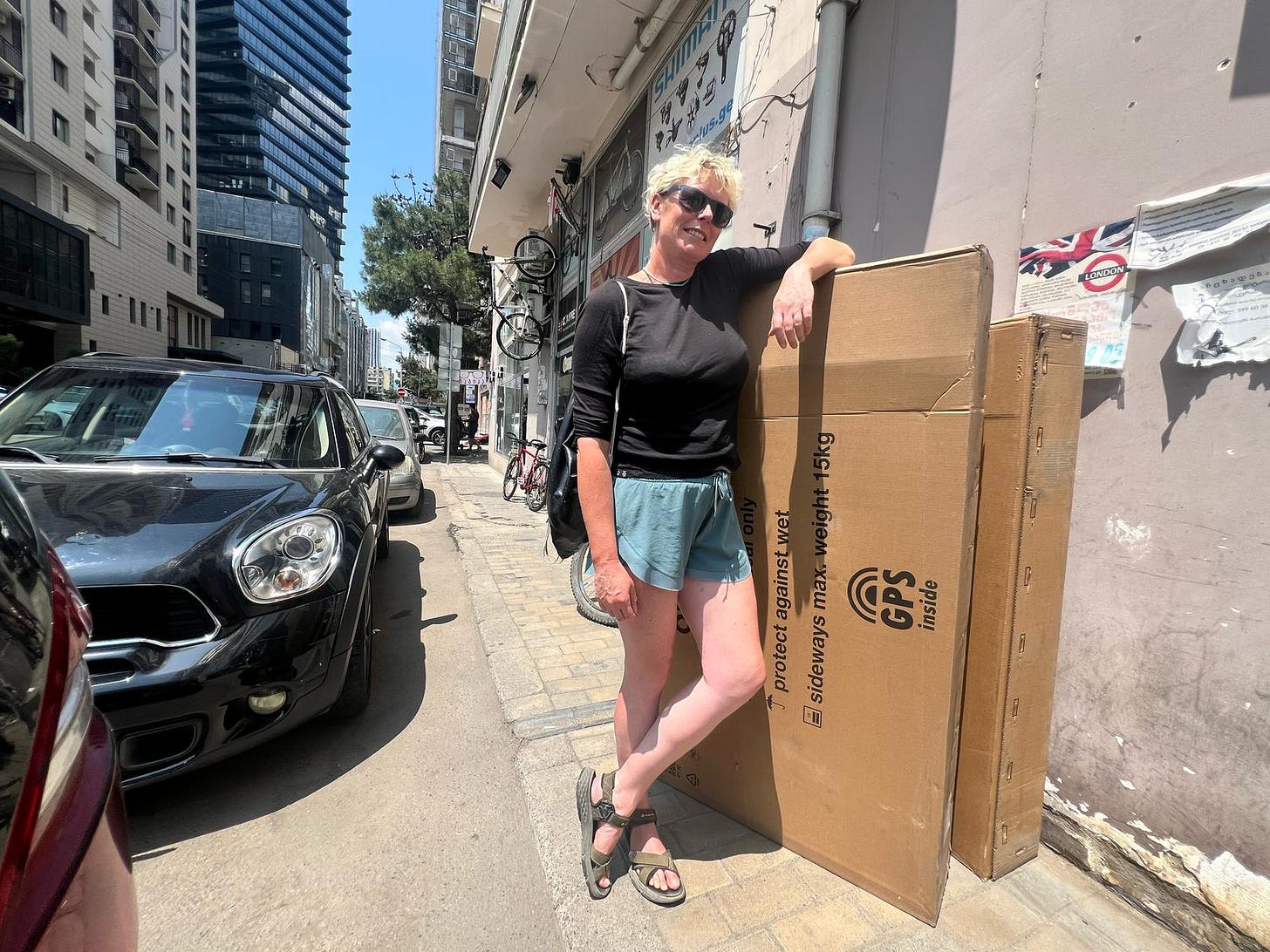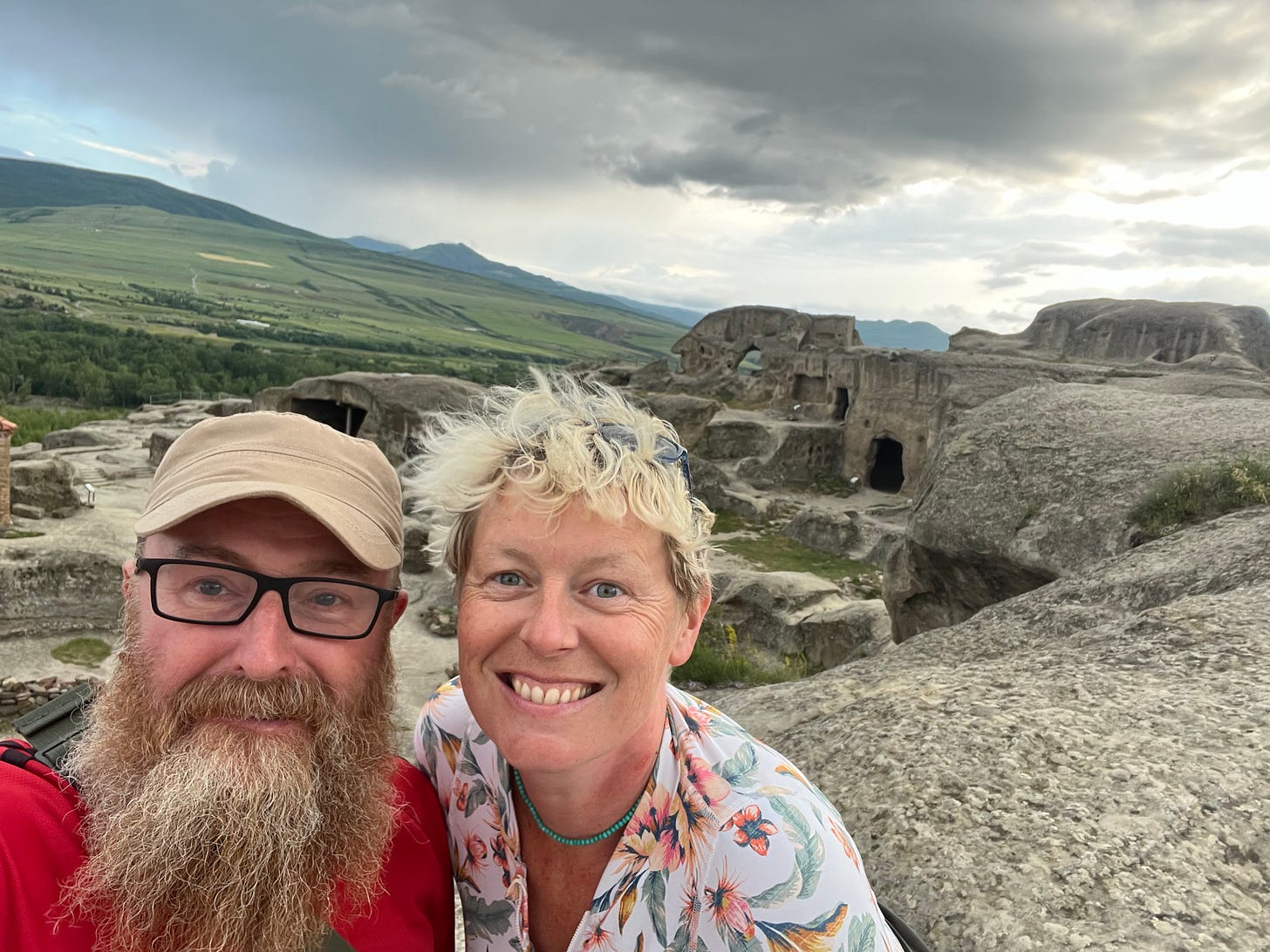24 little hours
Week 18 - decision time after some planning and preparation in Tbilisi sees Spoke Yokes plotting a course through the countries of Central Asia…and 24 hours involving gunshots, Stalin and a drenching.
So, after an eventful time of it in Georgia, we’ve been cooling our heels in the uber-cool Tbilisi for the past few days.
It really is a beautiful and fascinating city, home to over a third of the Georgian population of just 3.7 million, and as the capital of such a small country, it punches well above its weight when it comes to art, culture, heritage and much more.
A visit to the musical ethnography museum was really interesting, and around every corner is a new sight: a bathhouse dating to the 4th century, the higgledy-piggledy tower of the Gabriadze Puppet Theatre, street art and markets and sculptures.
But any sight-seeing has been happening in between planning our next steps, and taking care of some other things like bike repairs and travel jabs and, for Mark, a visit to the barber’s that he won’t mind me saying is well overdue: beard fan an’ all that I am, whenever his facial hair gets to the stage that I can no longer locate his mouth for a kiss, I start wishing the shears would come out.
Irish consul to the rescue
We also met with our own personal guardian angel from Tipp, in the form of the honorary Irish consul to Georgia, who bailed us out of a minor scrape by personally transporting a new bank card from Ireland for Mark.
Several weeks ago in Türkiye, Mark noticed some dodgy payments on his card, to none other than Paddy Power: Mark may have his vices, but fortunately crisps rank higher on his list than bookies. He had to cancel his card, and so for a few weeks we had to make do with me withdrawing cash from ATMs for him.
This was uncomfortable both because he started saying “thanks, boss” as a joke whenever I was doling out his folding money, but also because it felt a little like a mild version of how I imagine the insecurity of only having one remaining kidney to feel: you really, really need that other one not to fail.
One dark and rainy night in a small Turkish town, an ATM machine appeared to have swallowed my own bank card, and we knew we had to resolve the issue.
Getting important things sent when you’re never sure of your next move, which you’re not, on a bike, takes a bit of organising.
We had hoped to contact a Georgian host via the Warmshowers app who would accept mail for us, but you’d be a bit reluctant to have a validated card sent into the unknown, not to mention the risk of having to hang around for whatever length of time a postal service would take.
Then I had the idea to go old-school and contact the Irish consular office in Tbilisi: newfangled apps be damned, if it worked for Dervla Murphy, who received all her missives from home via various embassies when she cycled to India in the late sixties, it would work for us.
Through a happy coincidence, the Irish consul, Jeffrey Kent, happened to be in Ireland and about to fly back to Georgia, and so we put him in touch with Mark’s mum and he brought the card on the plane with him. We were able to collect it promptly, as well as to get some fascinating and entertaining insights into life in Georgia over a thank-you pint.

Our next steps
We had always hoped to be able to complete this Quixotic world quest of ours as entirely under the power of our own legs as possible.
And so, having done much knocking on embassy doors and sending of emails, it is with considerable reluctance that we interrupt our cycle with a flight, but having considered all options and having met with no success in procuring either a transit visa for Turkmenistan nor permission to enter Azerbaijan via its land border, we will pack up our bikes and fly from Tbilisi to Aktau in Kazakhstan on Tuesday night.

It would be possible to fly from Tbilisi to Baku, the Azeri capital, and we know other cyclists who have recently taken this route …but only to take an 80km spin as far as Azerbaijan’s sea port on the Caspian coast and then take the ferry to Aktau anyway.
Having looked at our resources of time and money, we feel that sadly, we will have to skip Azerbaijan entirely as it’s just not worth flying into Baku for just one day’s cycling in Azerbaijan. We hope that the situation that prevents anyone from accessing this amazing country, which ironically hosted the COP29 climate change summit in 2024, without jet fuel will eventually be resolved and that those borders will open.
But in Kazakhstan, the border woes are not over and we will also have to put our bikes on a train to cross into Uzbekistan, due to the Beyneu border being closed, apparently for road repairs rather than for political reasons.
So now, the plan is to arrive in Aktau, cycle for the bones of a week through a very hot and arid Western Kazakhstan, and then take a train from Beyneu to Nukus in Uzbekistan and then, fingers crossed, be able to continue cycling unimpeded through Uzbekistan, back into Kazakhstan, and then into Kyrgyzstan, back into Kazakhstan and into China.
In a funny kind of a way, it feels like Tbilisi is the end of one leg of our journey and the beginning of another.
We are really, really excited about the start of our time in Central Asia. And a little bit worried about how hot it is going to be, truth be told. But we can and will adapt, and we’ll be on possibly one of the most well-travelled and ancient trade routes in human history: the fabled Silk Road.
It’s a little sad not to be able to continue to cycle through the remainder of Georgia and into Azerbaijan: after being able to enter and exit so many countries by bike, to experience the changing environments as a kind of cross-border continuum as cultures and languages and landscapes change, it feels somehow abrupt to just pack up all our gear and jet out of this country that we are only beginning to know.
24 hours in Georgia
Last Monday, the day before we arrived into Tbilisi, we had an incredibly full day that took in a lot of the best and strangest that this country has to offer: this week’s video was all filmed within that action-packed period.
It started with the sound of gunshots in Surami.
Shortly after leaving our lovely hosts Ilia and Salome, with whom we had had a cup of homemade mint tea before departing, we found ourselves accidentally embroiled in a traffic jam: there was a wedding party on the road ahead, complete with horses and carts, blaring horns, two young men on very very spirited horses at the start of the wedding party and, right in front of us, a guy who looked like he had just come from an audition for Reservoir Dogs standing in the back of a cart shooting a pistol into the air.
The bride and groom, looking rather sheepish and clad in traditional Georgian wedding attire, were in a cart somewhere halfway down the hullabaloo.
The whole thing was kicking off so much and blocking the road so effectively that we decided we would try to overtake them, and of course, to add our congratulations into the mix. The Reservoir Dog guy took this rather to heart and emitted a volley of shots to impress us as we passed.
It was 9am, and more things were to follow. We found ourselves cycling down a high river valley filled with wildflowers, on the side of a dual carriageway that was quite busy but had a lovely wide shoulder.
On this stretch, we saw a sign for an agricultural produce market and we turned in on Mark’s hunch that they would have two items we had been wanting to add to the supplies: Churchkhela and Tklapi.
Some people go so far as to credit the legendary fighting prowess of Georgian warriors down through the ages to these two awesome trail foods: taking advantage of Georgia’s phenomenal abundance of fruit, these foods have been the mainstay of soldier’s saddlebags in the region possibly for millennia.
Tklapi may seem the more familiar of the two: a type of fruit leather that is made of pulp painted onto sheets and left to dry, packing a sweet and sour punch and a fantastic source not only of natural sugars but of vitamin C and other nutrients.
Churchkhela has sometimes been referred to as the original power bar: nuts, usually walnuts or hazels, are threaded onto a long string and then dipped in fruit juice, usually grape, which is thickened with flour or cornstarch. The result looks more like a candle than something to munch on, but delivers a powerful hit of natural fruit sugars, and keeps well and even improves in flavour for up to a year.
We picked up some Churchkhela and Tklapi for our road ahead, and as we were pulling out of the market, we noticed a few little specks of rain dapple the dusty road.
Five minutes later, we were cycling in the heaviest rain I have ever experienced. Enormous drops as big as a 1 cent piece soaked us to the bone, and rolls of thunder could be heard in the mountains. Not only were we being drenched by the rain itself, but also by the passing cars and trucks as a huge quantity of surface water quickly engulfed the highway.
Luckily, a sturdy bus stop loomed into view and we could take shelter and change our clothes. It really was a phenomenal downpour. And because the air temperature was quite high, about half an hour after the rain had abated as abruptly as it had begun, the roads had steamed themselves bone dry.
We made our way into the town of Gori, the birthplace of none other than Joseph Stalin: a lot of people don’t know that Stalin was from Georgia, but he was born Iosef Djugashvili in Gori when it was a part of the Russian empire.
We’re not normally all that good at doing the touristy things and will frequently opt not to stop at important landmarks and historical monuments. But we said we’d make an effort and stop in the Stalin museum.
It is an incredibly strange and discomfiting experience: despite a downstairs room which acknowledges that possibly the GULAGs were not the nicest idea, alongside some graphic images of Georgia’s 2008 war with Russia in South Ossetia, the remainder of the museum is set up as what can only be described as an homage to Stalin.
A humble cottage that is supposed to have been his birthplace has been reconstructed outside. The bulletproof train carriage that he travelled in is also outside.
Upstairs, a series of rooms show a chronology of his life, from young and handsome revolutionary (whose features bear little or no actual resemblance to any of his later images) to the familiar kindly, avuncular and wise propaganda depictions of him in his latter years.
There’s even a very hushed and reverent chamber containing a replica of his death mask.
I found all this a little difficult to stomach, to be honest. It’s possible to create exhibitions that explore and acknowledge rather than exonerate and idolise.
But I’m happy we saw it. One very interesting thing to see was the nationalities of the large number of other tourists who were present. There was the odd German or French tourist, but the bulk were Russian-speaking, Chinese, and Israeli.
We took our leave in a slightly subdued and contemplative frame of mind, and cycled on to Uplistsikhe, where there is another sight to behold: a city carved from the living rock, founded in the Iron Age, once home to 20,000 people, and abandoned after the Mongol invasions of the 14th century.
We knew it would be early evening before we would be able to explore this amazing place, so we booked into a homestay a couple of kilometres down the road, and stashed our heavy pannier bags, cycling up to the ancient stone city in time for an hour of wandering around in awe, and an incredible sunset over the river valley.

Leaving Uplistsikhe, we were famished and half hopeful of one of the restaurants on the country road up to the archaeological site being still open. “That one’s definitely open anyway,” Mark said. Banging tunes were blaring out of the gate: Boney M’s One Way Ticket To The Moon, to be precise.
But as we cycled in the gate, we realised that the music was coming not from the restaurant itself, but from a covered area behind it, where a trestle table laden with the remains of a feast was set and where about 20 men had clearly already embarked on their journey to the moon with the aid of many litres of young wine and a sound system that, we later discovered as we wended our slightly tipsy way home, could be heard two villages over.
As soon as they saw us, they started gesturing frantically for us to join them. Plates and glasses were produced and mountains of food placed in front of us, and our glasses charged.
There was no common language, but that didn’t deter a new and firm friendship rapidly evolving. It was hard to establish what the occasion was - I used Google translate to ask the gentleman sitting to my left, and he tapped an answer into my phone, with great effort as he squinted through ever-thickening beer goggles: it said “it’s the children’s birthdays.” This was a bit baffling because there were no children, or even women, at this party.
The DJ sang a Georgian song - he had a rich and beautiful baritone, and the song was clearly a rousing one, with a huge key change in the middle that had half the assembly on their feet and joining in. Then there was a speech, delivered by a man choked with emotion.
On our part, despite the overwhelming kindness and generosity and lovely welcome, we started to want to make an exit. It’s generally a good rule not to be in heavy-drinking situations when you don’t know what is happening: emotions can run high and you can be accidentally offending or irritating someone without knowing it. Things were at that tipping point into rowdy.
So Mark burst into song, much to the delight of the party, and delivered a rousing version of Home, Boys, Home.
Then amidst the ensuing applause, we rapidly stood up, thanked all round us, shook many hands and hopped back on our bicycles. As we cycled away in the direction of our lodging, still famished and now a bit drunk, the sound of more disco tunes rose into the thickening evening air, echoing around the ruins of the capital of the ancient Kingdom of Kartli and across the plain of the great Mtkvari river.
We found a shop, where we bought pot noodles, and went back to our homestay to eat in our room, and agreed that it had been an absolutely massive day in Georgia.
It felt like much more than a single day.
Then we sank gratefully into bed, only to discover that you actually DID sink into them. They were some kind of old institutional type bed with a woven metal base, filthy mattresses and, most alarmingly, the remnants of thin strips of rag tied to the headboard and footboard.
If I had a business supplying props to horror movies, I would snap up those beds, which would be perfect for any insane asylum/human experimentation hospital/haunted orphanage type setting. Otherwise, I would dismantle them for scrap.
Mark subsided into sleep with his customary ease, and I lay for a long time, trying to get comfortable on the infernally creaky and sinky bed.
I was preoccupied with wondering what kind of party we had just attended, trying to picture what Uplistsikhe could have looked like when it was a seat of power greater than Tbilisi or Mtsheka and when its people worshipped a pre-Christian sun goddess, developing a theory that the young man version of Stalin seen in propaganda photos was actually not the same person as the older man, and worrying that some horrible former occupant of the asylum bed I was lying on would come back to haunt me.
But then again, there was a lot of food for thought. It had been quite the day.










Another amazing adventure
Still feel shivers of apprehension and adventure. Was at Vicki’s Dare To Dream in Theatre Royal and thought of you both. Surreal or what?
Earlier walking in Tramore and found myself thinking of Dermot and the Island. Mad stuff and 3 Swans.